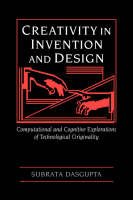
Creativity in Invention and Design
Seiten
1994
Cambridge University Press (Verlag)
978-0-521-43068-5 (ISBN)
Cambridge University Press (Verlag)
978-0-521-43068-5 (ISBN)
This book is about creativity and the nature of the creative process in technological invention. The author shows how certain ideas in cognitive science and artificial intelligence can be used to analyse, describe and explain an important invention taken from the history of computer technology.
Creativity is a topic that has traditionally interested psychologists, historians and biographers. Developments in cognitive science and artificial intelligence have provided a powerful computational framework in which creativity can be studied and the creative process can be described and explained. In this book, creativity in technology is discussed using such a computational approach. Using an important historical episode in computer technology as a case study, namely the invention of microprogramming by Maurice Wilkes in 1951, the author presents a plausible explanation of the process by which Wilkes may have arrived at his invention. Based on this case study, the author has also proposed some very general hypotheses concerning creativity that appear to corroborate the findings of some psychologists and historians and then suggests that creative thinking is not significantly different in nature from everyday thinking and reasoning.
Creativity is a topic that has traditionally interested psychologists, historians and biographers. Developments in cognitive science and artificial intelligence have provided a powerful computational framework in which creativity can be studied and the creative process can be described and explained. In this book, creativity in technology is discussed using such a computational approach. Using an important historical episode in computer technology as a case study, namely the invention of microprogramming by Maurice Wilkes in 1951, the author presents a plausible explanation of the process by which Wilkes may have arrived at his invention. Based on this case study, the author has also proposed some very general hypotheses concerning creativity that appear to corroborate the findings of some psychologists and historians and then suggests that creative thinking is not significantly different in nature from everyday thinking and reasoning.
1. Creativity, invention and the computational metaphor; 2. A computational theory of scientific creativity; 3. Maurice Wilkes and the origins of microprogramming: the historical setting; 4. Prolegomenon; 5. The genesis of an idea: creating the initial sketch; 6. The evolution of an idea: from initial sketch to mature form; 7. Eight hypotheses about the nature of inventing; 8. Epilogue.
| Erscheint lt. Verlag | 24.6.1994 |
|---|---|
| Zusatzinfo | 4 Tables, unspecified; 36 Line drawings, unspecified |
| Verlagsort | Cambridge |
| Sprache | englisch |
| Maße | 158 x 236 mm |
| Gewicht | 514 g |
| Themenwelt | Geisteswissenschaften ► Psychologie ► Allgemeine Psychologie |
| Geisteswissenschaften ► Psychologie ► Verhaltenstherapie | |
| Mathematik / Informatik ► Informatik ► Theorie / Studium | |
| ISBN-10 | 0-521-43068-2 / 0521430682 |
| ISBN-13 | 978-0-521-43068-5 / 9780521430685 |
| Zustand | Neuware |
| Haben Sie eine Frage zum Produkt? |
Mehr entdecken
aus dem Bereich
aus dem Bereich
Techniken der Verhaltenstherapie
Buch (2024)
Julius Beltz GmbH & Co. KG (Verlag)
35,00 €


